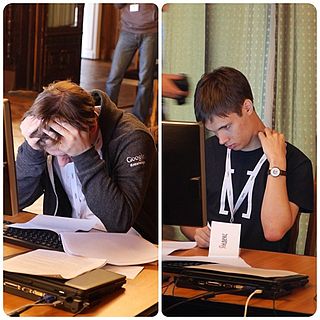A distributed system is a system whose components are located on different networked computers, which communicate and coordinate their actions by passing messages to one another from any system. Distributed computing is a field of computer science that studies distributed systems.

The International Olympiad in Informatics (IOI) is an annual competitive programming and one of the International Science Olympiads for secondary school students. It is the second largest science olympiad, after International Mathematical Olympiad, in terms of number of participating countries. The first IOI was held in 1989 in Pravetz, Bulgaria.
Backtracking is a class of algorithms for finding solutions to some computational problems, notably constraint satisfaction problems, that incrementally builds candidates to the solutions, and abandons a candidate ("backtracks") as soon as it determines that the candidate cannot possibly be completed to a valid solution.
Topcoder is a crowdsourcing company with an open global community of designers, developers, data scientists, and competitive programmers. Topcoder pays community members for their work on the projects and sells community services to corporate, mid-size, and small-business clients. Topcoder also organizes the annual Topcoder Open tournament and a series of smaller regional events.
The Canadian Computing Competition (CCC) is an annual programming competition for secondary school students in Canada, organized by the Centre for Education in Mathematics and Computing at the University of Waterloo. Stage 1 is written at high schools and can be written in the programming language of the students' choice, with only a few, such as Maple and Mathematica, disallowed. There are two levels of problems presented, Junior and Senior. The top 20 students in the Senior division are invited to the University of Waterloo to participate in Stage 2, the Canadian Computing Olympiad (CCO). CCO participants are restricted to languages permitted at the IOI, which currently includes only Java, C and C++.. The CCO is used to select students to represent Canada at the IOI.
The United States of America Computing Olympiad (USACO) is an online computer programming competition, which serves as qualification for the International Olympiad in Informatics (IOI) in the United States of America. Primarily for secondary school students in the United States, the USACO offers four competitions during the academic year. Participants compete in four increasingly difficult divisions, each of which is provided a distinct set of 3 solvable competitive programming problems during each contest. Coding & submitting computer programs can be done in one of four languages: C, C++, Java, and Python. Competitors begin in the Bronze division, and advance through the levels by performing well in their current division.
The Centre for Education in Mathematics and Computing (CEMC) is a Canadian educational organization dedicated to promoting and creating activities and materials in mathematics and computer science. Founded in 1995 with origins dating back to the 1960s, it is housed within the Faculty of Mathematics at the University of Waterloo. It runs off of funding from the University of Waterloo, Deloitte, the Bill and Melinda Gates Foundation, and other individual donors. Its mission is to increase interest, enjoyment, confidence, and ability in mathematics and computer science among learners and educators.

CrypTool is an open-source project that is a free e-learning software for illustrating cryptographic and cryptanalytic concepts. According to "Hakin9", CrypTool is worldwide the most widespread e-learning software in the field of cryptology.
PC² is the Programming Contest Control System developed at California State University, Sacramento in support of Computer Programming Contest activities of the ACM, and in particular the ACM International Collegiate Programming Contest. It was used to conduct the ACM ICPC World Finals in 1990 and from 1994 through 2009. In 2010, the ACM ICPC World Finals switched to using Kattis, the KTH automated teaching tool; however, PC2 continues to be used for a large number of ICPC Regional Contests around the world.

Crowdsourcing involves a large group of dispersed participants contributing or producing goods or services—including ideas, votes, micro-tasks, and finances—for payment or as volunteers. Contemporary crowdsourcing often involves digital platforms to attract and divide work between participants to achieve a cumulative result. Crowdsourcing is not limited to online activity, however, and there are various historical examples of crowdsourcing. The word crowdsourcing is a portmanteau of "crowd" and "outsourcing". In contrast to outsourcing, crowdsourcing usually involves less specific and more public groups of participants.
The Texas Advanced Computing Center (TACC) at the University of Texas at Austin, United States, is an advanced computing research center that provides comprehensive advanced computing resources and support services to researchers in Texas and across the US. The mission of TACC is to enable discoveries that advance science and society through the application of advanced computing technologies. Specializing in high performance computing, scientific visualization, data analysis & storage systems, software, research & development and portal interfaces, TACC deploys and operates advanced computational infrastructure to enable computational research activities of faculty, staff, and students of UT Austin. TACC also provides consulting, technical documentation, and training to support researchers who use these resources. TACC staff members conduct research and development in applications and algorithms, computing systems design/architecture, and programming tools and environments.
In mathematical optimization and computer science, heuristic is a technique designed for solving a problem more quickly when classic methods are too slow for finding an approximate solution, or when classic methods fail to find any exact solution. This is achieved by trading optimality, completeness, accuracy, or precision for speed. In a way, it can be considered a shortcut.
Natural-language user interface is a type of computer human interface where linguistic phenomena such as verbs, phrases and clauses act as UI controls for creating, selecting and modifying data in software applications.
UVa Online Judge is an online automated judge for programming problems hosted by University of Valladolid. Its problem archive has over 4300 problems and user registration is open to everyone. There are currently over 100000 registered users. A user may submit a solution in ANSI C (C89), C++ (C++98), Pascal, Java, C++11 or Python. Originally it began without the last three options, but the Java option was added in 2001, the C++11 option was added in 2014, then the Python option was added in 2016.

Competitive programming is a mind sport usually held over the Internet or a local network, involving participants trying to program according to provided specifications. Contestants are referred to as sport programmers. Competitive programming is recognized and supported by several multinational software and Internet companies, such as Google and Facebook.
Benelux Algorithm Programming Contest (BAPC) is a programming contest for students from Belgium, the Netherlands, and Luxembourg. It is organized annually by an institution of higher education. From 1991 through 2004, the contest was held under the name NKP.
GPI-Space is a parallel programming development software, developed by the Fraunhofer Institute for Industrial Mathematics (ITWM). The main concept behind the software is separation of domain and HPC knowledge and leaving each part to the respective experts while the GPI-Space as framework integrates both parts together.

HackerRank is a technology company that focuses on competitive programming challenges for both consumers and businesses. Developers compete by writing programs according to provided specifications. HackerRank's programming challenges can be solved in a variety of programming languages and span multiple computer science domains.

Topcoder Open (TCO) is an annual design, software development, data science and competitive programming championship, organized by Topcoder, and hosted in different venues around US. In the first two years, 2001 and 2002, the tournament was titled TopCoder Invitational.
Codeforces is a website that hosts competitive programming contests. It is maintained by a group of competitive programmers from ITMO University led by Mikhail Mirzayanov. Since 2013, Codeforces claims to surpass Topcoder in terms of active contestants. As of 2018, it has over 600,000 registered users. Codeforces along with other similar websites are used by top sport programmers like Gennady Korotkevich, Petr Mitrichev, Benjamin Qi and Makoto Soejima, and by other programmers interested in furthering their careers.





